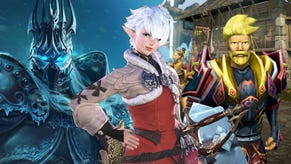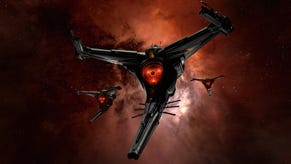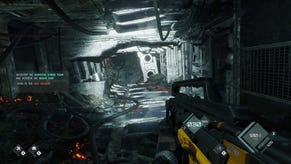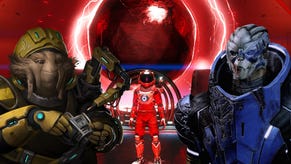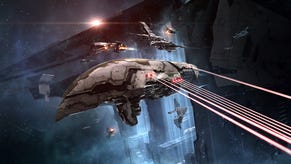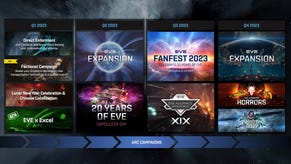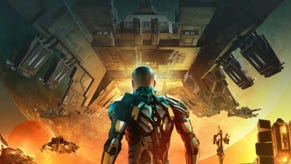RPS Exclusive: Eve Online Interview
I can't honestly recommend Eve Online.
I play it, and it's remains one of the most fulfilling, frustrating, exciting and excruciating gaming experiences I've had. Eve is a game that has expanded the list of interesting stuff in the world, and it has created an utterly unique and beautiful game in the process. But I can't recommend it.
I can recommend Peggle to anyone, but Eve, well, I'd say that you should consider yourself warned. There's nothing else like it, in the same way that's there's nothing else like the crushing gravity of an exquisite neutron star. This is a cruel, beautiful singularity in MMO space. It's the one online game that is actually a 'virtual world' in any sense, and I feel as if every single player has left a mark on it in some way. Just like real life, we all have something to add, no matter how inconceivably microscopic that contribution might be.
It really is The Long Game. Commit to Eve and there's a chance you'll begin to get wrapped up in something temporal and psychological - something you'll struggle to articulate to outsiders. I've been writing about Eve for nearly five years, and I still don't believe I'm quite getting the message across.
It's a big spaceship MMO, and there's lots of things to do... What lies beyond the jump includes some general information about what there is to do in Eve, discussions of some issues that will only matter to the players, and plenty of food for thought from one of Eve's most senior developers, Nathan 'Oveur' Richardsson.
I've been playing Eve on and off for over four years. I'm only just running out of things to do, and that's only because I'm not much of a politician, or trader, or manufacturer, or miner. I'm just a pilot. That's okay, because the core of Eve is third-person real time space combat - which doesn't seem to happen anywhere else. Getting good at that alone is a gigantic task, but it's the other stuff - the logistics, trade, manufacturing and production - that really start making this the most complex MMO out there.
Eve's Icelandic developers, of course, never seem to run out of things to do. They just keep on evolving the universe they've made, etching in detail on what was original an empty galaxy, and is now a bustling 200,000-pilot community. Theirs is the longest game of all. They've been at it for ten years now.
I thought it was time to talk to Richardsson and see what motivated him to keep the game expanding and evolving (other than his paycheck, natch), and what he felt the game still has in store for bemused old mariners like me. I've annotated what is otherwise a straightforward Q&A to fill in non-Eve players on some of the issues we cover. Read on for a nebulous kind of enlightenment...
RPS: Are you still enjoying making Eve Online? What gets you out of bed in the morning?
Nathan: I've always been driven by taking on new challenges, repetition is my version of hell, I think. Fortunately, with EVE there are always new challenges. It can be a server hardware upgrade, the Need for Speed initiative bringing back performance as our main objective, the next expansion, the graphic engine upgrade ... there's always something new. Part of it is also that EVE has done a lot for my life, it's been very pivotal and a part of me is eternally grateful for that so coming to work in the morning and meeting EVE always makes one happy in the pants.
Yes. Anyway, earlier this year we saw one of the radical directions that Eve could go in, which was to turn its previous spaceship-bound pilots into moving, walking characters, who could hang out and interact inside the game's space stations and structures. I had to ask Nathan about that.
RPS: Walk-on/walk-in stations? What's the thinking behind the demo we've seen of characters in station environments?
Nathan: It's about creating a stronger foundation for the role-playing and social elements of EVE and to embrace the emergent gameplay. Okay, sorry for the buzzword soup! In more human terms, EVE is built upon social networks and we wanted to create a setting where that could be taken even further. It's hugely player-driven, where all establishments are owned by players, including corporate offices for meeting, planning and recruiting, plus we hope to have venues like bars for karaoke or gambling. We then want to see what patterns emerge, what one really uses the in-station tools, props, scriptable NPCs, rooms and establishments for. Then we go with the flow. There is no combat there though, that happens outside the stations.
Role-playing is also an essential part of EVE, though it may not follow the typical parameters one might associate with role-playing. You wont' find pilots saying things like, "Hark! An enemy approacheth! Reload thy rocket launcher and avenge our ancestors!" Instead, we have players who portray themselves, except in EVE they are leaders of corporations and alliances, freedom fighters, infamous pirates or savvy traders. Ambulation plays a big part in furthering that, add in another layer of opportunity for players to expand their social networks
Long term, we're expanding upon this to other locations where we feel it has the potential to add to the social experience. For example, on the bridge of a capital ship or the control room of a starbase managing it's defences.
Meanwhile the small matter of conquering the universe trundles onwards, with huge Eve fleets crashing into each other at any opportunity. The matter of actually capturing the systems and holding it, now governed by a time-based 'sovereignty system' has always been rather awkward for CCP, and the system of stationing orbital towers (player owned structures) in a system to capture it seems to have created more problems that they solved. Most recently, CCP have been trying to turn the game more towards small skirmish warfare, to avoid the lag that is created with 200+ pilots try to invade the same system.
RPS: We've seen some interesting changes to sovereignty and to the way stations can be attacked - do you think that has encouraged more skirmish-based warfare? What else can you do to break up the giant fleets?
Nathan: On certain levels it has, but it's not achieving it in my opinion. Today, we have to do far more to achieve a solid position for skirmish warfare in a siege of solar systems. We need more goals, especially aimed for skirmishes and small-scale combat.
The hard part is finding goals that are worth pursuing without them being too crippling at the same time, effective enough to warrant either constant skirmishing or strategically timed strikes, and not more effective to simply land a blob of ships and do it serially. It must become more effective to do the things in parallel.
We have to do a lot of groundwork before we can tie together goals like that and we're just starting there. On the other hand, we've been focusing more on fixing, improving and optimizing all warfare and shied away somewhat from adding more to the mix. We'll be able to rethink it from a better position after the next expansion and I look forward to more warfare challenges there.
Over the last year CCP were rocked by a series of small scandals, the crucial one being the actions of a developer who helped out a player alliance. The aftermath has seen CCP protest their impartiality, and the creation of player-run council to examine how CCP runs the online galaxy. It's an unprecedented move for an MMO, and one fuelled by CCP's insistence that they are the caretakers, rather then the rulers, of the Eve world.
RPS: How do you feel about the whole "corruption" debate now that the worst of the noise seems to have subsided? Was the player ombudsman concept inevitable?
Nathan: I think it emphasized that perception is reality and when we aren't providing information on the process on how we think and work, the perception gives a grim picture of us, especially in light of events like this.
I think this moved up the ombudsman concept and we're hoping that the reinstitution of the Council of Stellar Management, which we'll be talking about at Fanfest this year, will give players a platform through which they can voice their concerns as citizens of EVE and allow us the opportunity to work with them to address those concerns.
We've always considered ourselves more as janitors than gods and feel that the power should be in the hands of the players to create empires, nations even. This is another (big) step towards realization of that vision and we sincerely hope it evolves into something great.
In a virtual society like EVE, there will always be differences of opinions, allegations of abuse of power (real or perceived) and an outcry for change. It's a bit of a slippery slope in that while it validates the legitimacy of an online game's value as a virtual society, it also presents us with some very real issues that have to be addressed.
One of Eve's most appealing features is that it is a single shard, with a second Chinese-language galaxy operating in Shanghai. Everyone in America, Australia, Europe and Asia logs into the same game world. There's often over 30,000 people in the game at the same time, and the busiest trade systems will be populated by hundreds of people at once. There might, however, be a limit to how busy Eve's world can get.
RPS: With the population of Eve continuing to expand it's beginning to seem like things are getting a little crowded. Are there any more plans to extend the galaxy? How busy would things have to get for you to open up a second shard?
Nathan: Absolutely, we have lots of options for expanding the EVE universe. We talk of expansion in a couple of ways, there is "inside" such as getting into stations, structures, planets, asteroids, meteors - you name it. We have scenarios involving everything you can foresee yourself being inside and maybe even a couple which you couldn't foresee. Stations are just the beginning there, opening up the possibility of other areas.The other is "outwards", that would be opening up entirely new regions, Jove space, even new galaxies. The EVE gate hasn't opened yet, you see.
With both these as tools to expand the EVE universe, we're quite well set before we reach a point of sharding. This isn't covering the technical aspects, though. Our main bottleneck right now is simulating the same area of space on multiple CPUs.
It's the causality bubble, where you have 500 ships seeing each other then start shooting each other for some unknown reason. (Why can't we all just be friends?) To scale those over multiple CPUs, we're looking at supercomputer technology which has become feasible to utilize, like Infiniband and Remote Direct Memory Access. With that solved, we'll be faced more with game design problems rather than technical or "space" problems. People will gather at hotspots and there are diminishing returns to scaling the exact same space.
Eve is only partly about space combat. A large number of players engage in it simply as a game of trade and economics, and the universe supports a large number of trade tools and manufacturing projects that players can undertake. This is an RPG in which 'crafting' is more like “late-capitalistic mass production-ing.” And CCP are keen for players to exploit that angle on their universe.
RPS: You recently employed a full time economist, "DrEyoG", what do you think he'll bring to the game?
Nathan: We're already seeing a lot of things happening there but for clarity, we should emphasize that he's not here to directly control the economy, he's providing in depth insight into what is actually happening in the economy. He's already published his first findings and will be doing so monthly in addition to publishing a big quarterly report, the first of which will be out in October.
It's also about influencing game design. An example would be that when we create a stock market, he's identifying the key factors that drive a market and so on. New stuff and tweaking our current stuff, expanding the market tools. Add to that the projects we're starting with academia on all the data that's been gathered, hopefully to the point of proving certain economic theories inside EVE.
One major change to economics will be driven by the recent addition of invention to Eve. Where before new tech was introduced via blueprints distributed by NPCs, now players are going to be able to invent stuff themselves. It's a big change, and has already made a number of previously monopolised products cheap on the open market.
RPS: Invention seems to have changed Eve pretty radically - do you intend to make invention the focus of new technological developments in the Eve universe from now on?
Nathan: Yes, war is the mother of all invention so it's only fair to have it as a driver for technology in EVE. Of course, we aren't at the point yet where we can provide a lot of freedom inside of it, creating your "own" module or ship, but it's a solid foundation for a more player-driven approach to releasing new technology in EVE. We'll probably expand it, perhaps with Invention as a (big) part of the process but complimented with other steps.
Then, of course, there's the epic back-story of galactic nations and bloody millennial conflicts. While the fiction has taken a back-seat over the last couple of years, there are now plans to bring it to the fore, and create content based on the strife between the galaxy's various races. It has so far been known as 'factional warfare' and has long been promised as a part of Eve's regular updates.
RPS: Can you explain why we should excited about factional warfare?
Nathan: It's entirely depending on what part of your EVE life-cycle you are in; if you are already deep in corporate and alliance warfare, there isn't much new for you in factional warfare. Our strategy was simple: Evolve all warfare in EVE and then provide a light structure on top of that which allows you to move into organized small scale PVP with somewhat pre-set goals. The intention is that in the long term, it will motivate you to create your own corporation with your wingmen and set your own goals.
If you are a role-player and want to fight for the factions, this is also an opportunity for you and to get recognized for your efforts. However, in the long term, we don't like controlling this. We're kind of imitating what's already happening. If what's already happening isn't interesting enough, we have to address that, not create another version of warfare which is "fun".
An example of moving it more into the hands of the players would be to allow the player alliances to declare war on the factional warfare fleets. That would take us out of the loop somewhat and it would be very interesting to see how that fares, but it's still too early to tell. We've gone many rounds of designs and, fundamentally, it's against the vision of EVE for us to create goals for you. But as a tool to introduce you to this part of EVE it can be really powerful.
Alongside invention came exploration, which allows pilots to scan systems and uncover hidden treasure troves. Missions that they dig up for themselves, essentially.
RPS: Are there any more plans to expand exploration? How do you feel about the way exploration works right now?
Nathan: Yes, what we're constantly adding to exploration are new sites and improving how you actually do exploring. We're happy that this element is finally a part of EVE but it will get much better and much deeper. More environments to scan for, more professions within exploration (like archaeology), more involved scanning tools for the higher end encounters, a more gradual entry into scanning. We even foresee mining moving entirely from static belts to exploration. Long term, someone needs to explore all those planets for resources and sites. That's what I look forward to.
Last year Eve entered a new age – one of capital ships. These are the big buggers like the Star Destroyers in Star Wars. They've changed the balance of the game somewhat, and annoyed many players with the way that they've shifted the possibilities for getting your arse handed to you. Adding a capital ship to any fleet grossly alters its firepower, and for smaller gangs they're ludicrously tricky to destroy.
RPS: A recent screen-shot ended up on my corporation's forums, showing over fifty capital ships, half a dozen of them super-capitals, all in a single gang. Do you think that means that capital ships are too cheap, or that that they're too hard to destroy? How do you feel about "the capital age" in Eve?
Nathan: Although usage of capital ships has risen tremendously lately, we don't really feel they are where they should be. It's a generalizing statement but we miss the smaller scale PVP and we don't like the escalation. Don't misunderstand, we don't want to remove large epic battles, but we don't want that to be the only effective way of a war.
They got a bit easier to destroy by enabling more tools to keep them in place and we are considering further changes to them, so we're getting closer. The easiest way to explain where they should be right now, in my opinion, is a more mixed fleet warring on multiple locations. Provide more incentives to take warfare to multiple locations--even multiple solar systems--at the same time, then additionally providing more direct benefits of having a mixed fleet so that bunching together the highest number of super-capitals is win and anything else is epic fail.
Formations come to mind when talking about incentives for mixed fleets, even as far as optimized sizes of squads that are in formations. Think of it this way: It should be really beneficial to have an interceptor squad together, and the optimal number of pilots to coordinate would be 5, so when the wing is at 5 pilots, you get maximum bonuses. If you are below or above that number, you get some diminishing returns but the interceptor squad would be much more effective.
Let's throw another one out there: If the interceptor squad is in formation, they can act as a single hit-point entity - and depending on interceptor formation, they would emphasize a certain bonus. The possibilities are endless really. The key is the match of multiple solutions in all warfare, but with endless possibilities come endless pitfalls and caveats, especially with warfare.
There isn't a "single fix" to which can be done to capital ships alone, we need to look at all goals in warfare, all incentives, all benefits, all ships and their abilities. All this comes after we've reached the level of client and server performance that all sizes of fleets can war on each other. The Need for Speed, you see. Nothing else matters if there is no speed.
Speed, hmm. I'll close with a personal bugbear: ships that go too fast for me to kill them. Out of all the factors of fighting in Eve, from electronic warfare, to missile splash damage, nothing has ever caused quite so much difficulty as the capacity for the ships to fly very fast indeed.
RPS: Last week an Ishtar [a middle sized cruiser ship the ramifications of which will be lost on non Eve players] escaped our bubble camp/interceptor gang. He flew off at - and this is no lie - just over 10km/s. What *is* going on with speed in Eve?
Nathan: Hahaha! Well, it's an eternal battle, really. Over time, the optimal setups appear, slowly inching towards the uber - and speed is one that seems to slide in there quite often. We've hammered it back a couple of times and it feels like we need to look at it yet again. Often it's simply mistakes which enable it, a bonus isn't stacking nerfed across an implamnt, module and rig and we fix that.
EVE combat wasn't thought out for this high speed. Note, speed is a very valid tactic in EVE warfare, but when we get to the point of anything above a couple of 1km/s it doesn't really matter how much more you get, you're pretty much invulnerable there. On the other hand, it's perhaps not the top speed that's really the issue here but how fast you accelerate to that speed. There are tools to slow you down and catch you but that's doesn't matter if you have no time to utilize them. It's a mixture of both.
So there you have it: CCP love their game, but are also dissatisfied with the solutions they've currently implemented. Eve will continue to grow, and expand in some weird new directions. I, for one, can't wait to see how the warlike pilots handle being able to meet face to face, while being unable to fight in any way.
I also hope that CCP are able to do something special with the forthcoming graphical update. For a game as old as it is there's still very little complaint from players about the way it looks. Another example, perhaps, of how a tightly executed visual theme once again trumps top dollar graphical effects...







